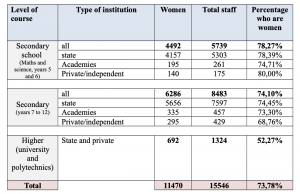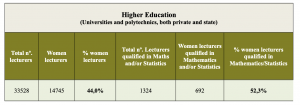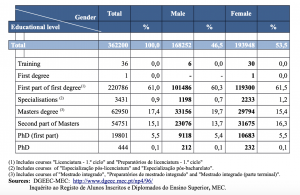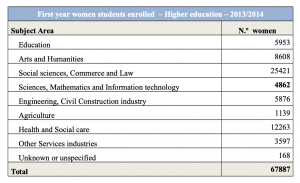EWM in Portugal 2013-2015
Global Gender Gap Index 2014: 39th
EWM membership
Currently, there are only 3 official EWM members from Portugal registered on the EWM website. Given the number of Portuguese members of the EWM Facebook group, I believe that, from our country, we have many more people interested and sympathizing with the aims of EWM. We intend to explain to Portuguese mathematicians how to register for official membership of EWM using our Facebook platform in Portugal: European Women in Mathematics – Portugal
The objectives of this Facebook group include: providing posts in the Portuguese language, supporting and encouraging Portuguese beneficiaries, to research and evaluate the situation and working conditions of Portuguese women in Mathematics and to collect data for the production of a report. In addition, I have invited some women by email as well as in person at conferences.
During the next few months, I expect that more Portuguese mathematicians will join the Facebook group.
Portuguese EWM Activities
With the aim of starting the Portuguese EWM Facebook group, the following invitation was sent to various Portuguese Facebook groups of Mathematics lecturers, Mathematics, Applied Mathematics and Statistics alumni:
Dear Mathematician,
Are you interested in becoming a member of the group European Women in Mathematics?
This invitation (including various appropriate website links) was sent to teachers and lecturers, researchers and mathematicians working in industry, students and others. Interested individuals were asked to fill in a questionnaire with some of their details, to be contacted subsequently by email.
(P.S. Male members were also welcomed to join and participate in our objectives in supporting women mathematicians, since our aims do not promote any form of sexism.)
This activity led to the creation of the new Facebook page and then Facebook group, which allowed and facilitated further and deeper interaction.
The group was opened in March 2015 and it currently has 240 members (both male and female mathematicians living in Portugal) and every day we receive new contacts interested in joining the group. Our current members include primary and secondary school teachers as well as university lecturers, university researchers and researchers working in industry (including consulting, information technology, insurance and banking) as well as training centres and private tutors.
In addition to the main objectives of the wider EWM movement, we define specific objectives for EWM-Portugal, as follows:
- To produce a report on the current professional situation of women mathematicians in Portugal in collaboration between the different members working in the various sectors listed above.
- To encourage and facilitate online networking between our members, to share information about job opportunities, grants and other opportunities specifically for women, and also to provide a forum for our members to discuss difficulties while participating in mutual support, such as reconciling the challenges of motherhood combined with career, tips for classroom management techniques and communication with parents/guardians when this can be challenging, and communicating concerns with managers.
- Arranging and organising national meetings for women mathematicians.
- Promoting participation in international events organised by EWM.
- Proposing open discussion questions, such as:
- Have you been awarded a prize in a competition or contest in which only women could be candidates?
- Have you been awarded any grant for female students/pupils?
- Have you and your spouse made use of any childcare provision at work or during a conference, etc?
- Have you ever felt discriminated against in the world of work because you are a woman? (For example, were you ever asked in a job interview about whether you were single or whether you were planning to have children in the next few years?)
- What would you like to change in any of these or related contexts?
Up until the present, we have been focusing on our first above-mentioned objective, which is to analyse the situation facing women mathematicians in Portugal. We researched and collected data and information relative to: Situations facing Portuguese mathematicians:
- Proportion of mathematicians working in Portuguese universities (as coordinators, lecturing staff or as temporary uncontracted lecturing staff, researchers and other types of contracts or positions) who are female.
- Proportion of grant candidates in mathematical subjects and the proportion of grants awarded to females (FCT, Gulbenkian, ERC etc.)
- Proportion of female mathematicians working in industry, programming, consulting, banking and so on.
- Proportion of secondary school mathematics teachers who are female.
- Proportion of personal mathematics tutors who are female.
- Proportion of mathematicians opening their own personal tutor outfit or business, who are female.
- Proportion of mathematicians who open or are principals/headteachers of private schools and colleges, who are female.
- Proportion of university students (undergraduate, masters, and PhD) who are female mathematicians.
- Proportion of female pupils enrolled on secondary school courses involving a strong mathematical component (such as sciences, information technology, economics, finance, etc).
Note: at the moment, data is available only for points 1, 4 and 8.
In a first analysis resulting from this study, we observed that, in Portugal, the majority of mathematicians work as mathematics teachers/lecturers, and only a small number work in industry, or in research. In this way, we were able to compare the number of women Mathematics teachers and lecturers Page 13/24 with the total number of Mathematics teachers and lecturers involved in each respective level of education delivery. Here are some results:

Table 1 – Teachers working in primary, secondary and higher education during the academic year
2013/2014 in Portugal (including the Azores and Madeira as well as mainland Portugal) – Sources: DGEEC-MEC: http://www.dgeec.mec.pt/np4/96/ Rebides – Registo Biográfico dos Docentes do Ensino Superior, DGEEC/MEC
It was observed that the higher the level of education, the lower the proportion of women involved as teachers/lecturers. That is, the proportion of women teachers is high at the primary level (78.27%) and decreases a little towards the upper end of secondary level (74.1%) and the decreases is accentuated at the higher education level (52.27%) It is important to underline the percentage difference between women teachers at state and private institutions, as this could be due to the fact that while recruitment of teachers at state institutions takes place by online competitions (while not selecting candidates, the ordering of candidates takes place through a computer program that compares candidates’ curricula), the recruitment process at private institutions normally involves a traditional interview and therefore there could be difference factors influencing the selection process.
At the lower secondary levels, this phenomenon occurs with less emphasis, which could be because the number of male teachers interested in teaching mathematics and sciences to pupils aged 10 to 11 years, is considerably less, that is, the number of male candidates seems to be much fewer. In terms of lecturing at university level (private or independent) in Portugal, the percentage of women lecturers was compared with the percentage of women lecturers with qualifications in Maths and Statistics at the same level. The overall results are presented in the table below:

Table 2 – Total number of lecturing staff with qualifications in the areas of Mathematics and Statistics in
Portugal in the academic year 2013/2014 – Source: Rebides – Registo Biográfico dos Docentes do Ensino Superior, DGEEC/MEC.
According to the database of the Portuguese Ministry of Education and Science, and our proceeding analysis of the 294 institutions of higher education in Portugal (all higher education institutions including private, state, university, polytechnical, in all the Portuguese territories: mainland, Azores and Madeira), it is found that, (perhaps unexpectedly), the percentage (52.3 %) of women mathematicians lecturing on university courses is higher than the percentage of women teaching in other disciplines (44%).
According to an investigation into the current interest in studying mathematical subjects at university level and careers involving mathematical subjects amongst the younger sector of the Portuguese population, the following data was collected and analysed:

Table 3 – Gender of students enrolled on higher education courses during the academic year 2013/2014.
Given these data, obtained from the Portuguese Ministry of Education and Science, and our proceeding analysis of the 295 higher education institutions (both independent and state) in Portugal, it was observed that, at all levels of training, the number of women enrolled on higher education courses in the academic year 2013/2014 was higher than the number of men enrolled, with an overall proportion of 53.5 % women.
Which higher education disciplines do women tend to prefer?

Table 4 – N.º of first year women enrolled in each subject area in Portuguese higher education for the academic
year 2013/2014 – Source: DGEEC-MEC: http://www.dgeec.mec.pt/np4/96/.
Although as many as 67,887 first year women students were enrolled on higher education courses in the academic year 2013/2014, only 7.16% of these were enrolled in Sciences, Mathematics and Information technology courses.
In particular, we studied the proportion of female students enrolled on first degrees, masters and PhD degrees in the areas of Mathematics and Statistics.

Table 5 – Total N.º of students enrolled on Mathematics or Statistics course and their gender. Data for 2013/2014 – Source: Inquérito ao Registo de Alunos Inscritos e Diplomados do Ensino Superior, MEC.
From the database obtained from the Portuguese Ministry for Education and Science, 23 higher education institutions were analysed (both private and state-funded). One observes that of the total number of students enrolled on Mathematics or Statistics courses, 52% are women.
In summary, from the information presented in tables 3 and 5, one concludes that the total number of women studying at higher level in 2013/2014 (193,948 women) only 0.69% of them chose a course in Mathematics and/or Statistics (1,340 women). It is our endeavour to organise activities that will lead to an increase in this number during the years to come.
Acknowledgements
To Rachel Martins for the great help on translation to English. To João Faria Martins and Teresa Araújo for the help on the creation of the EWM-Portugal Facebook page and group.
